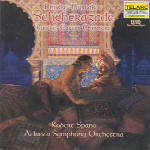Far more than their pictorial associations suggest, these two works are about great orchestral playing. It doesn’t matter how “personal” or unique the interpretation might be; if the musicians don’t play the hell out of the music, the performance will turn out a dud. A classic proof of this contention can be found in the last two recordings of Leopold Stokowski. No one had a more special view of the work (or recorded it so many times). The interpretations in both cases are exactly the same, right down to the added xylophone in the second movement, harp glissandos in the third, and tam-tam crashes in the finale. The difference lies in the execution: the LSO on Decca plays with the requisite panache, the Royal Philharmonic on RCA does not, and so the result suffers accordingly.
In a very auspicious debut recording with his new orchestra, Robert Spano certainly has some ideas about how this music can go, but more importantly, he gets truly great playing from the Atlanta Symphony, a tribute as much to outgoing music director Yoel Levi as to what we can expect going forward. In Scheherazade, you hear countless perceptive details that reveal an intense engagement with both the spirit and letter of the score: the wind tenutos at letter B (Tranquillo) in the first movement; the timpanist’s healthy mezzo-forte at measure 130; the rich surge of strings at letter E. Notice in the second movement the lovely espressivo of the bassoon (who has a genuine piano dynamic) and oboe in their opening solos, and the feathery lightness Spano brings to the central march section. He also allows the strings a lovely and wholly appropriate touch of portamento in their phrasing of the third movement’s principal theme and obtains wonderfully crisp yet very soft percussion in the central section.
Spano even indulges in a little dynamic modification in the cellos and basses à la Stokowski at the solo violin’s second entrance at the beginning of the finale. Any my, how the Atlanta band plays from that point on! Spano sets exactly the right tempo, fast enough to be exciting, but not so fast that he prevents the trumpets and horns from clearly tonguing their repeated-note figures at letter Q. The final shipwreck has a grand sense of spectacle, with superbly imperious trombones and the best bass drum you’ll ever hear, though a bit more crash out of the tam-tam would have been nice (Spano sounds exactly like Kondrashin in this respect, and the part is only marked “forte”). That quibble aside, you’ll be thrilled by the contribution that a truly first-rate, precise, brilliantly colorful percussion section makes to this music. The tambourine player alone deserves a medal.
Most impressive throughout the movement though (indeed, the whole work), is the way the strings audibly dig into their parts, whether singing out those luscious tunes, or remaining dazzlingly clear and accurate in their purely rhythmic accompaniments. Even the simple drumming on double-stopped fifths from the violas and cellos the middle section (letter K) has just that extra bit of presence and resonance. A word of praise also goes to concertmaster Cecylia Arzewski’s sexy, affectionate representation of the leading lady herself. In sum, you won’t find a better-played recording of this piece anywhere, from anyone. Compare this effort to Kondrashin’s benchmark reading with the Concertgebouw, and you’ll hear immediately that if not necessarily superior, the Atlanta players match them moment for moment, desk for desk. They’re that good.
The Russian Easter Overture, for all its popularity, has not had very many successful recordings: Markevitch, Zinman (Philips), and Svetlanov (Melodiya) come immediately to mind, and also perhaps Ansermet. Stokowski’s surprisingly lame and monochrome version isn’t helped by cuts in the final pages. Spano’s is the best rendition of the work to come around in years. Once again, the soloists of the orchestra–violin, cello, trombone, harp, and woodwind–really do themselves proud, riveting your attention on their lovely tone and shapely phrasing until the piece gets going. And once it does, watch out! Spano keeps the tension mounting right through the grand closing pages, and Telarc’s stunning recording perfectly balances strings, massed brass, and low percussion to create a truly magnificent peroration. I can’t imagine a more distinguished or musically appealing first release from this exciting new partnership. If future titles maintain this same standard, music lovers will have a lot to look forward to. [12/29/2001]
































